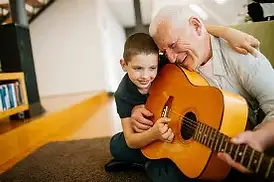.jpg)
How does Music Therapy work?
Music therapy works by stimulating different areas of the brain that store memories and emotions. While Althzimers disease damages many parts of the brain, the areas linked to music and long-term memory can often stay intact longer despite the disease. This means that familiar songs have the ability to "wake up" forgotten moments, spark conversations, or provide patients with a sense of peace.
Music has the ability to reduce agitation, boost mood, and encourage engagement from many different types of patients. Whether through listening, singing, or moving to the beat, music therapy creates new opportunities for connection between patients and families.

How Music Activates the Brain

Music engages multiple different regions of the brain at once. These regions include the hippocampus (memory), the prefrontal cortex (emotions and decision making), auditory cortex (sound processing), and motor areas (movement). The widespread activation areas make it one of the most powerful tools for stimulating memory and cognition.
Why Music is Linked to Memory

Unlike other forms of information, music is stored in both emotional and memory networks of the brain. Because Alzheimer's disease doesn't affect these areas until later stages, familiar songs often remain accessible even when spoken language and daily memories fade. Thats why a person may forget names but still sing every lyric to a favorite childhood song.
Music and Emotional Recall

Music is deeply tied to emotion. A single song can bring back the feeling of a very important events in one's life (ex. a wedding day, a family gathering, or a cultural tradition). For people with memory loss, these emotional connections act as "shortcuts" to memories, helping them recall meaningful moments or reconnect with their sense of self.
The Role of Music in Alzheimers Care

In Alzheimer's disease, music therapy doesn't just bring joy. Music can reduce anxiety, eases agitation, and increases social interactions. Scienfitic research shows that patients who regularly engage with music often sleep better, show fewer behavioral symptoms, and enjoy higher overall well-being. Music can become a form of non-verbal communication when words are no longer sufficient.